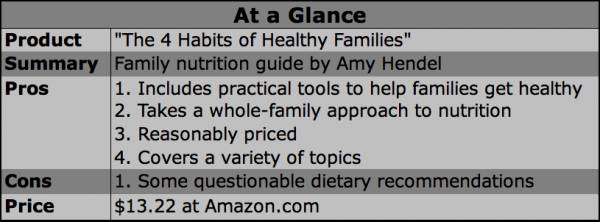
Having a healthy family isn’t always as easy as it sounds. With hectic schedules and convenience food available practically on demand, it’s easy to make excuses and let health become less of a priority than it should be. Amy Hendel’s book, The 4 Habits of Healthy Families, provides some great solutions for avoiding common pitfalls and making health a way of life, rather than just an enforced rule.
With over 400 pages of information and recipes, Hendel’s book is comprehensive and thorough. However, although the length of the book might seem intimidating, it’s actually a quick read with a lot of sidebars and informational anecdotes. Although we follow different dietary guidelines in our own family, the planning ideas that Hendel provides have been helpful for our shopping and menu planning. She also outlines some strategies to encourage healthy eating for children, which every parent knows can be a challenge.
One of my favorite things about this book is Hendel’s emphasis on making healthy eating a whole family approach. As she says, “If Mom or Dad decides to diet and starts to drink those shakes or control food portions, but they still bring home processed foods, fast foods, and temptations for the rest of the family, they’ll inevitably falter and fail. Kids don’t fare any better when they’re expected to make changes while other family members maintain old habits.” I know families who do okay with each family member doing their own thing, but our own family has had the opposite experience. Sure, we each have foods we like to enjoy now and then, and occasionally our kids will eat a different meal than my husband and I do if they really don’t like what was prepared, but for the most part we eat together and nutrition is a family affair.
So what are the four habits of healthy families? Here’s a brief description of each one:
1. Plan Together: According to Hendel, this is most important element of her program. “Planning food and meals means less wasted time, less stress, less arguing, and more feeling in control, all of which help to prevent ‘grab and overeat.'” Hendel also points out that planning meals creates structure for kids, which helps establish good habits from an early age. She also provides some helpful tips for eating out without compromising the habits you’ve worked so hard to foster in yourself and your children.
2. Prepare Together: My husband and I like to cook together and have always done so. I’ve found this tip to be especially helpful with my children. As Hendel points out, cooking with your kids not only makes them more comfortable with the food and less likely to react out of fear when they see Brussels sprouts on their plate, but can also be educational. Hendel provides a nice list of kitchen skills for children in a range of age groups.
3. Portion Together: Hendel outlines the science behind portion control and provides some tips for decreasing portion size, as well as advice for kids’ and teens’ portions sizes. For those who aren’t familiar with reading nutrition labels, she also provides a visual guide for reading and interpreting food labels.
4. Play Together: Hendel has a background in exercise science and acknowledges that diet is only one part of the health picture. “If you aren’t teaching your children to be active, you are neglecting one of the most important lessons you could probably ever pass on to them.” Some of the recommendations seem a little weird to me (like counting your daily steps), but I like the fact that Hendel included this section as one of the four healthy habits.
My primary criticism of Hendel’s book is that she promotes certain foods as healthy that are actually questionable. For example, in Hendel’s examples of meal plans you will find things like sweetened cereals and non-fat fruit yogurt cups. These recommendations may be a step in the right direction for some families, but if you’re reading this book with any background in dietary theory – for example, the idea that fat might actually be good for you or that you should limit grains and dairy – you might not find the food recommendations particularly helpful.
Nevertheless, although the dietary recommendations won’t fit some diets, such as paleo or vegan diets, there is plenty of other information and advice here for all families. The strategies are concrete and Hendel even provides lists and charts in the back to help get your family on the right track. All in all, The 4 Habits of Healthy Families is a helpful resource for families who want to make some lifestyle changes but need tools and motivation to help them get started.
“The 4 Habits of Healthy Families” is available for $13.22 at Amazon.com.






